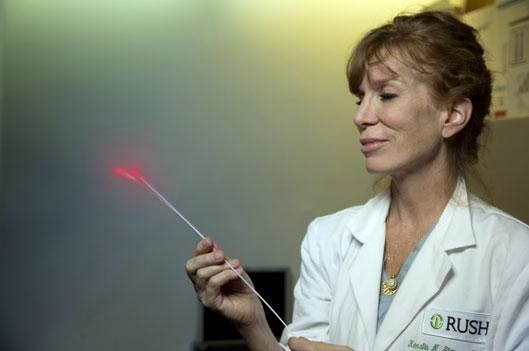
Kerstin Stenson with the laser optic leads used in photoimmunotherapy (Rush University Medical Center)
16 November 2016. A new type of cancer treatment that precisely attacks tumors with synthetic antibodies activated by laser beams is being tested in an early-stage clinical trial. The treatment known as photoimmunotherapy is developed by Aspyrian Therapeutics Inc. in San Diego, with Rush University Medical Center in Chicago as one of the 5 trial sites.
In photoimmunotherapy, a light-sensitive chemical known as a photosensitizer is combined with synthetic antibody that seeks out and binds only to specific biomarkers expressed by the tumor cells. The combination of photosensitizer and antibody is infused in the patient, where it’s taken up by the tumors. After 24 to 72 hours, surgeons attach thin optical fibers to the tumors and send near-infrared laser beams to the tumors marked by the photosensitizers. Energy from the lasers expands the targeted tumor cells while weakening the cell walls, causing the tumor cells to burst and destroy.
The clinical trial is an early-stage test of photoimmunotherapy’s safety, as well as to determine the maximum safe dose, among 24 individuals with recurrent and head and neck cancer considered unresponsive to other treatments. The study is evaluating RM-1929 code-named by Aspyrian Therapeutics that licensed the technology from National Cancer Institute, targeting epidermal growth factor receptors often expressed on the surface of tumors in head and neck cancers.
RM-1929 contains a combination of cetuximab, an engineered antibody approved by FDA to treat head and neck cancers, and a fluorescent dye designed to combine with antibodies for photoimmunotherapy. Cetuximab is marketed as Erbitux by Eli Lilly and Co. Aspyrian says preclinical studies show RM-1929 causes rapid destruction of human cancer cells grafted onto mice, which also have longer cancer-free survival than conventional treatments.
The clinical trial is looking primarily at the safety of photoimmunotherapy and the maximum dose of the drug and lasers in the treatments in the participants, who are tracked for a month. Of particular concern are effects of the treatments on the skin. Earlier forms of light-sensitive treatments known as photodynamic therapy reported cases of skin burns, including sunburn from exposure to direct sunlight. The study teams are also tracking chemical actions of the drugs in the body, responses or reductions of tumors, overall survival time, and progression-free survival time.
Kerstin Stenson, professor of otolaryngology and director of the study at at Rush University Medical Center, says in a university statement, “This treatment is so unique and promising because its cancer cell-killing power is so selective and immediate.” Stenson adds that “Almost immediately, you can see the tumor start dying. It turns white and melts away.” And because RM-1929 remains inert unless activated by the laser, she notes, it causes almost no damage to surrounding cells.
In addition to Rush University, the trial is recruiting participants at Centura Health Research Center in Denver, Virginia Piper Cancer Institute in Minneapolis, University of Oklahoma Stephenson Cancer Center in Oklahoma City, Thomas Jefferson University in Philadelphia, and MD Anderson Cancer Center in Houston.
Read more:
- Electronic Pulses Shown to Induce Cancer Immune Response
- Patent Awarded for Cancer-Fighting Antibody
- PhRMA: 258 Vaccines in Clinical Development
- Molecular Express, Baylor Medicine Partner on Vaccines
- NIH Funding Trial of Precise Tumor Removal System
* * *

 RSS - Posts
RSS - Posts
You must be logged in to post a comment.